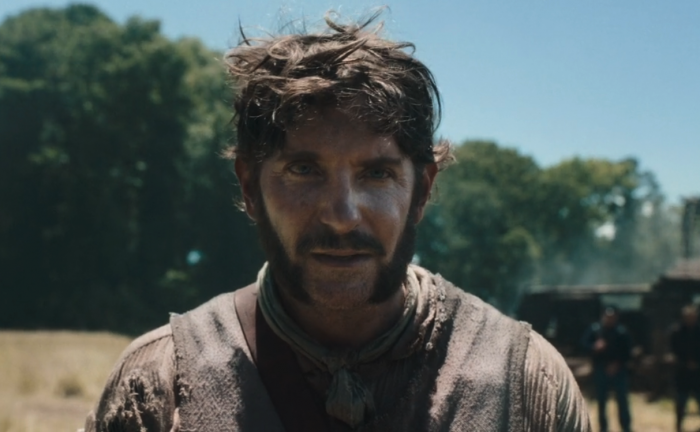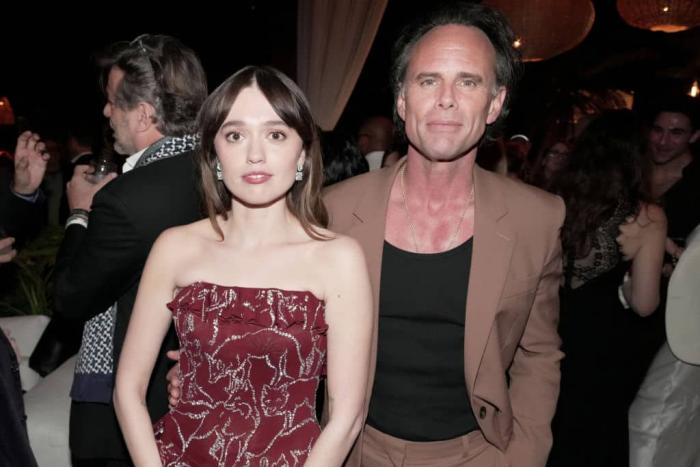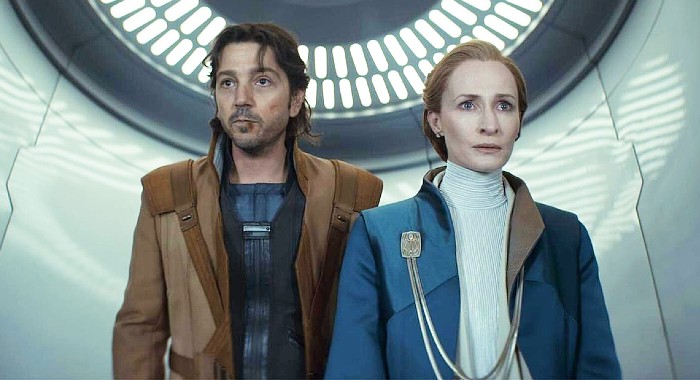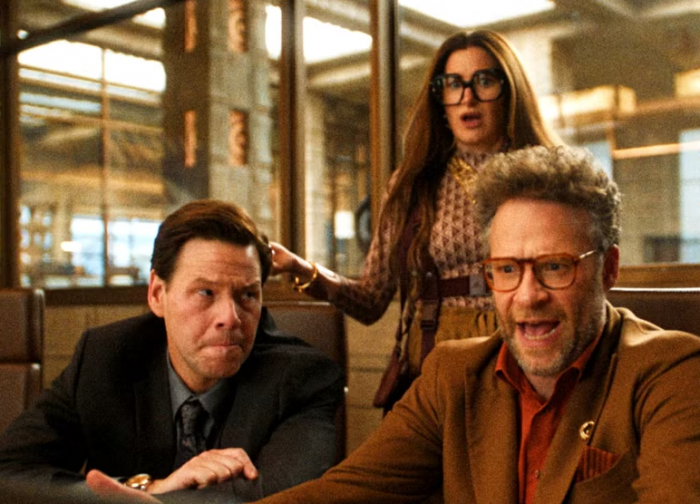
Review: Talking About 'Mandy' Is Futile. Just Watch It
By Tori Preston | Film | September 14, 2018

Mandy is an impossible movie to review.
I know. I know. Saying something is “impossible” to review is basically like saying I’m shit at my job (no comment). I even requested the honor of reviewing Mandy this month — the first time I’ve ever taken such liberties here — and now I feel like a damn fool for coming up short. I had already half-composed my theoretical review in my head, days before watching the movie, because in my haze of anticipation I believed I could sense the inevitable. I’ve got a half a dozen different ways to compare the experience of watching this film to sex, orgasms, and different classes of drugs just waiting to be written. And maybe I will use them! Because yeah, I wasn’t necessarily wrong about any of it. I was just very short-sighted.
The thing about Mandy is that it’s deceptively straightforward, plot-wise. Nic Cage plays a lumberjack named Red, who lives in the woods with his wife/partner/ladylove, the titular Mandy (Andrea Riseborough). Also, it’s 1983 for… atmospheric reasons, mostly. One day Mandy is spotted on the side of the road by a wannabe messiah named Jeremiah (Linus Roache), who becomes obsessed with her and sends his flock of devoted weirdos to track her down. They, in turn, summon some bikers who are somewhere on the spectrum between openly demonic and “maybe just had some bad LSD.” They all kidnap Mandy and quasi-crucify Red with some barbed wire. Then he pulls himself free.
By the way, that’s all in the first hour of the film. The second hour is just Red’s Bloody Revenge. And that’s it. That’s the movie.
Sure, I’ve omitted a few plot points, though I’m sure you can already guess what those are. More importantly? All that plot may be what happens — the mechanics driving the story from point A to B along a long, winding wooded road — but it’s not really what the film is. Mandy is, first and foremost, an experience. It’s a mood shaded in crimson and violet and fire and starlight. It’s defined by the uncomfortably long stares, directly at the camera, or the way it flits between surrealism back to blunt reality (there’s a scene after a brutal act of violence where the perpetrators just… walk back to their cars). The way the sound editing will drop a character’s voice into a guttural growl with no warning. The way Mandy’s face seems to superimpose over Jeremiah’s during his big speech. Red and Mandy’s cabin, composed entirely of different-sized windows that make it seem as though the characters sleep out in the wide open. That axe.
So to review Mandy is to try and describe the experience of Mandy — which is a fool’s errand because words will ultimately always come up short. But if you’ve seen director Panos Cosmatos first film, Beyond The Black Rainbow, you probably already expected that. Both films share a surrealist bent, a dream logic that acts as a throughline from scene to scene. Frames are composed like paintings — mini marvels of lighting and set design and perspective, all working together to create something almost frozen in time. And both films concern a woman, and a man — a victim and a zealot — and the twisted power dynamic between the two.
That woman is Mandy. That man is not Red.
Make no mistake, this film is Peak Cage through and through. But the movie is called Mandy for a reason. The script, co-written by Cosmatos and Aaron Stewart-Ahn, is broken into three sections that aren’t quite acts. The first luxuriates in the domestic bliss of Mandy and Red, and the second introduces Jeremiah’s cult and their quest to kidnap her. Through all of this, Nicolas Cage is barely there — he’s reduced to an idea, “The Man Who Loves Mandy.” He’s hulking, quiet, devoted, harmless. He’s not the Cage you’re expecting. Andrea Riseborough, however, is a goddamn revelation. From scene to scene she’s mousy, then ethereal. An artist, a nerd, a wood nymph, a mermaid. A wife. Her eyes are mismatched, she’s frequently washed out, and the camera both loves her like Red, and is as obsessed with her as Jeremiah is. She starts as an image, but by the end she’s a symbol. She is every woman laughing in the face of Male Privilege, and her cackles will haunt you just as much as they do Jeremiah.
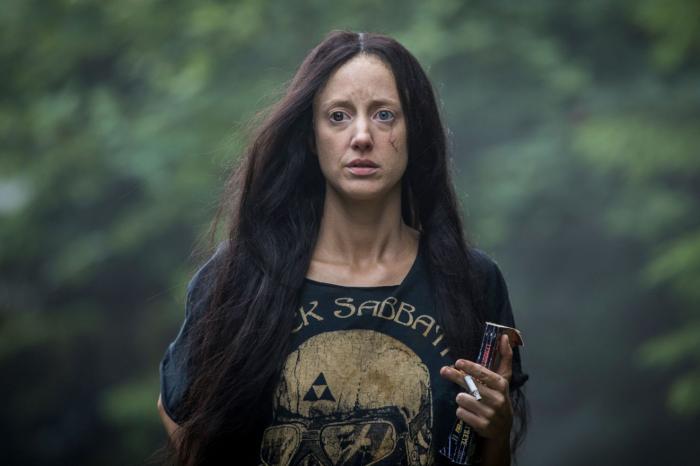
And as for Jeremiah? Ugh, he’s the WORST. He’s the kind of guy who stares at himself in a mirror, pleading for some higher being to tell him what to do. And the answer? “Don’t ever doubt yourself.” He genuinely believes he has a divine right to take whatever he wants from the world. His desires, his needs — everything he surveys is there to serve his interests. He’s the kind of dude who will try to impress you by bragging about how he’s “been blessed with the comfort of many women” but hey — you’re special. He’s the kind of dude who, you know, forms a cult of worshippers around himself, and bangs the chicks in it, and gets himself pumped up by listening to his own hippie rock single on vinyl. And he’s also the kind of dude who casually orders his minions to summon evil bikers, kidnap women like property, and sacrifice fat kids just because. He’s over-the-top, sure. But a lot of his villainy feels a little too lived-in. A little too real.
But it’s that third chapter that everyone is waiting for. And yes, Cage does Rage. All the blood and gore that’s only hinted at in the surprisingly demure, bucolic early sections of the film is more than paid off in the back half, with chainsaw fights and blood geysers and Red lighting a cigarette off a burning fucking skull. In a scene that’s probably already being edited into countless “Nic Cage Freak Out” compilations on YouTube, Red locks himself in a bathroom and chugs a bottle of liquor while gasping, grunting, screaming, and generally hyping himself into that unique Cage-ian fervor that means shit’s about to go OFF. It’s the bathroom of Red’s cabin, but it may as well have been Cage’s dressing room. It’s a turning point for his character, who is finally embarking on his journey of revenge, to hunt down the bikers and the Jesus freaks and finally Jeremiah himself. And it’s a turning point for the film as well. If the first two chapters had been dawdling along in a psychedelic shroomy haze, then the final chapter is suddenly sharpened by cocaine and painkillers and speed.
The film is Peak Cage because it demonstrates the full patented range of Nic Cage talents. He’s the kind of movie star whose very presence is inescapable. On screen, he is always, to a certain extent, “Nic Cage.” And sure, the same could be said of Tom Cruise or Harrison Ford, but what sets Cage apart is a lack of self-consciousness or ego. We may look at him and see the movie star, but he is always immersing himself wholeheartedly in his role, whatever that may be. Here he’s as frumpy as he is angry, an unintentional action star gone soft. He’s unglamorous. He allows himself to disappear for a full hour, biding his time, and then gives it his all in the back half. He luxuriates in the long pauses, the scenes held too long, the bloody-faced stares, the weirdness and awkwardness amidst the violence. Mandy is a film that balances the evils of mankind with the banality of what comes before and after, and Cage inhabits that fine line so well. But most of all, he manages to blow some coke and forge his own battle axe and live up to every fucking expectation you had for this movie… without making it all about him. He’s no John Wick, stoically carving a path of righteous vengeance. He’s just a very emotional, addled, hurt man that loves a woman named Mandy.
This is not a movie for everyone. It’s slow, deliberate, disturbing and nonsensical at times. Its rhythm is off. It’s fucking weird in a way you either will accept instantly or it will drive you nuts. But as an experience? As an immersive, 2-hour drug-induced dream dreamt to a synthy soundtrack while laying on a bed of dewy grass? It’s a masterpiece.
And also I’m like 99% sure the ending is literally a giant orgasm. Or at least that’s how it felt.*
* in my pants

